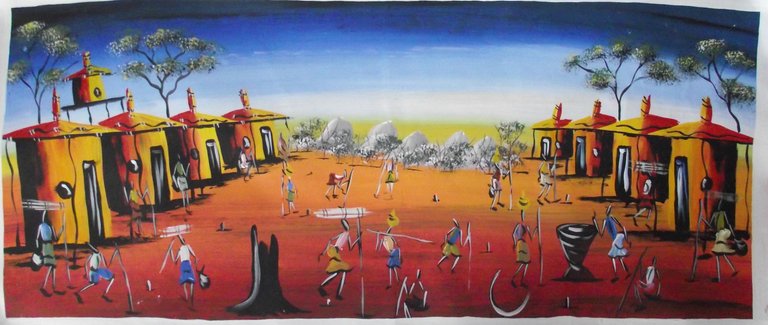
In 1980th Malawi was one of the most centralized countries in Africa, ruled by the Malawi Congress Party (MCP). To practice a religion, to make a movie or to publish a book required a stamp of official approval. Malawian governmental buildings' administrators were categorically instructed by Lilongwe bureaucrats to have a portrait of Kamuzu Banda (the President For Life of MCP) hanging on a wall higher than any other decorative elements including pictures, clocks or flowers.
The list of honors bestowed by Malawians on their leader among other extravaganzas included the following:
at all occasions of Banda's arrivals to an airfield a band of female dancer must be present there;
when Banda's car was passing through Malawian cities streets all residents was obliged to close windows, get out of apartments and cheer.
Malawian population were forced to follow a strict code of social rules. For example, under the threat of severe punishment men's hair wasn't allowed to hang over his collar. Even foreigners arriving into Malawi were expected to comply with this rule and an obligatory haircut was prescribed for a violator.
However, in a sharp contrast to the image of classical totalitarian state, Malawi practiced an open door policy towards displaced persons. This country was even named the "heaven" for African refugees by some Western medias. Furthermore, Banda became one of the first autocrats, who voluntarily allowed for his country's peaceful transition from dictatorship to multi-party democracy.
In 1993 Malawian voted on a referendum, which resulted in the discontinuation of one-party system. Following 1994 presidential elections Banda step out from his office passing it to Bakili Muluzi, who led the newly formed, liberal, pro-Western United Democratic Front (UDF).
Malawi has became a presidential republic where the 193-members National Assembly is unequally divided among four major political parties: the "big tent" Democratic Progressive Party (DPP), which holds to a nominal parliamentary majority of 50 seats; the reformed MCP (48 seats), which adapted new, "ubuntu" (human cetric) slogans; the center-right People's Party with 26 seats and the center-left "United Democratic Front" (UDF) holding to 14 seats.
Still, despite all of those political reforms, neither Dr. Banda nor his successors have been able to bring an economic prosperity to Malawi impoverished population. Malawi, with its per capita less than $350, remains one of the poorest countries in the World. 85% of Malawian population is rural. Agricultural industry contribution to country's GDP exceeds 35% with tobacco remaining a major constitute (around 40%) of the Malawian export.
There's, yet, another, unofficial cornerstone of country's economy. The so-called 'Malawi Gold' or 'chamba' is the local specie of cannabis, which estimated production in the country exceeds 70 tons a year (0.2% of total Malawi's GDP). That presents a serious challenge for local law enforcers and politicians. Not seeing any improvements some international help organizations have already suspended their contributions to country's budget.
Understandably, Malawi is not an homey place for startups founders. Agriculture industry - the major pillar of Malawian economy - is low-tech and highly monopolized. Malawian population is relatively small for an African country (about 16 million), with the majority of SME potential customers localized in country's two major cities - Lilongwe and Blantyre. Harsh economic conditions, unfriendly regulatory regime, rising inflation are added by inherited deficiencies of Malawian basic telecommunication infrastructure, which largely out-of-date equipment makes Internet unattainable for 93% of local population. Mobile communication remains the only viable option for local users of all ages.
Obviously, with all that growing economic and social discrepancies Malawian government has many other serious issues besides Bitcoin to worry about. Consequently, the Reserve Bank of Malawi (RBM) has still kept its official opinion on crypto-currencies unannounced. Same goes for other governments bureaucrats, including those from the Ministry of Finance, Economic Planning and Development, which, if questioned by medias representatives on the growing Bitcoin popularity in the world, usually refer them to RMB.
However, there are plenty of other people (often self-proclaimed various industries' "representatives"), which didn't miss an opportunity to express their unsubstantiated concerns with Malawian public unawareness with "dangers" posed by the world's most advanced form of instant payments. This, in its turn, raises an another issue for Malawian government - that of financial literacy. Simply by educating people about basics of money and personal finance might significantly reduce an anxiety experienced by many Malawian faced by rapid and poorly understood technological advancements.
Business Notes for Startups Founders:
political climate: not friendly;
economic climate: not friendly;
regions to focus: locally;
industries to focus: mobile commerce, FinTech, e-jobs;
major limitations: poor population, high administrative barriers for SME, high inflation (11%) and interest rate (at 18%), over-concentrated economy, deficit of qualified personnel, outdated infrastructure;
stimulus: low costs, low competition, large population;
opportunities: to find a local niche market protected from outside competitors.
Cryptocurrencies and ICOs (outlook): not regulated (moderately negative).
The author: Svyatoslav (Svet) Sedov
Angel investor and founder of The First International Incubator for Silicon Valley Companies (FirstInternational.In) in the Bay Area, CA, USA.
Twitter: https://twitter.com/SvjatoslavSedof